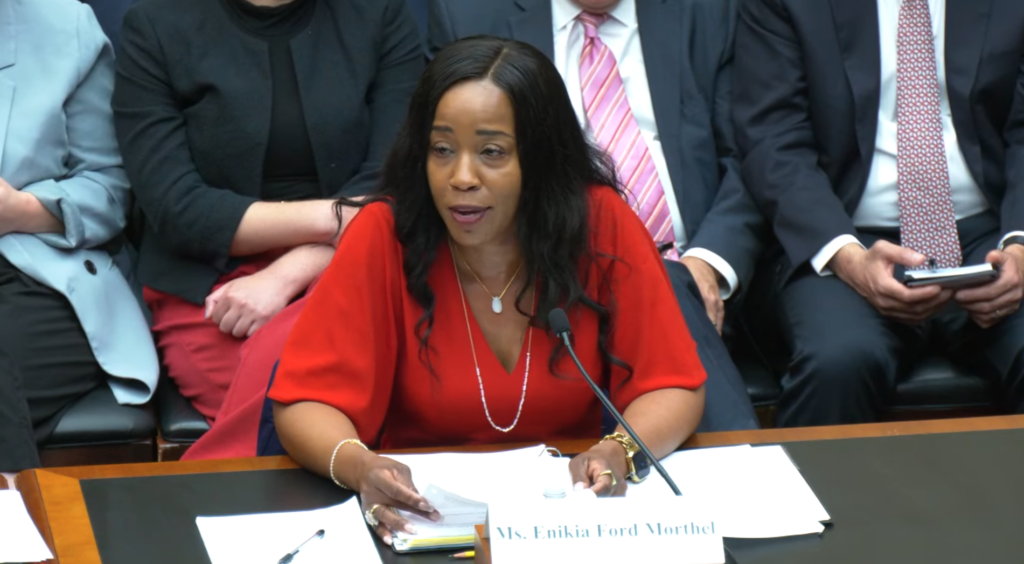
Berkeley Unified School District Superintendent Enikia Ford Morthel speaks before the House Education and Workforce Committee hearing on May 8, 2024.
Credit: YouTube
This story was updated on May 8 to include hearing testimony and additional reporting.
The Office of Civil Rights in the U.S. Department of Education informed Berkeley Unified Tuesday that it will investigate charges that the district has failed to respond properly to rising incidents of antisemitism in its schools.
Berkeley Unified Superintendent Enikia Ford Morthel acknowledged receiving the notification letter during a grilling on Capitol Hill Wednesday during which she said the district investigated nine formal complaints by parents of antisemitism against students.
“However, antisemitism is not pervasive in Berkeley Unified,” she told members of a subcommittee of the House Education and Workforce Committee. “When investigations show that an antisemitic event has occurred, we take action to teach correct and redirect our students.” She declined to specify what those actions were, citing state and federal confidentiality laws.
https://www.youtube.com/watch?v=F1M4yPBKdT8
The Office of Civil Rights is responding to a Feb. 28 complaint by two Jewish civil rights organizations urging an investigation into the “virulent wave of antisemitism” aimed at Israeli and Jewish students in Berkeley Unified schools. The “bullying and harassment” started after the Oct. 7 massacre by Hamas of Israelis and the brutal retaliation by the Israeli army in Gaza.
In its letter, the Office of Civil Rights said it would investigate two issues. One is whether the alleged harassment by students and teachers violated Jewish students’ protections based on national origin (shared national ancestry) under Title VI of the Civil Rights Act. The second issue is whether students and teachers threatened to retaliate against two parents who had complained about harassment.
The complaint cites an instance in which an elementary school teacher threatened a parent who complained about her pro-Palestinian instruction. The name and alleged specific threat were redacted.
This week, the Louis D. Brandeis Center for Human Rights Under Law and the Anti-Defamation League expanded its 41-page complaint on May 6. It amplified its request for an investigation, stating that “the already-hostile environment for Jewish and Israeli students” has worsened. It said that recent school board meetings “have devolved into vicious attacks on Berkeley Jewish parents by (Berkeley Unified) faculty members shouting defamatory lies and anti-Semitic tropes about Jews.”
“Jew hatred is escalating at an alarming level,” the updated complaint said.
The complaint asserts that the district has “created a hostile environment that leaves Jewish and Israeli students feeling marginalized, attacked, frightened, and alienated to the point where many feel compelled to hide their Jewish or Israeli identity.” It cited the hostile atmosphere at school board meetings where Jewish parents were taunted, including one mother who said her son and other students were called “dirty Jews” and “kikes,” an epithet for a Jew.
“Non-Jewish students are led by their teachers’ example to believe that they can freely denigrate their Jewish and Israeli classmates, telling them, e.g., that ‘it is excellent what Hamas did to Israel’ and ‘you have a big nose because you are a stupid Jew,’” the complaint said.
Berkeley, synonymous with decades of protests, from the Free Speech Movement and the Vietnam War through Black Lives Matter protests, is now a flash point of acrimony over how the Palestinian and Israeli conflict is being taught in its schools, including a district-adopted Liberated Ethnic Studies Model Curriculum that views Israel and Zionists as oppressors.
The resulting antisemitism is why district Ford Morthel was summoned to for questioning at a Republican-led House hearing titled “Confronting Pervasive Antisemitism in K-12 Schools.”
At a recent Berkeley Unified board meeting, Ford Morthel said she viewed the civil rights complaint as “an opportunity to further examine our practices, procedures and policies and to ensure compliance with federal laws and to make sure that we are truly advancing towards our mission and our values for all of our students.”
In the complaint, the civil rights organizations charged that district has not responded to “scores of complaints” by parents, and neither the school board, which has regularly heard evidence from parents at meetings, nor has Ford Morthel intervened or indicated concern, the complaint said.
With names redacted, the complaint and follow-up cited dozens of instances of antisemitic behavior based on firsthand observations and students’ accounts to their parents.
“In every case and every incident that we listed, there was notification, and sometimes parents begged for help with certain things, and there was either not an adequate response or no response,” said Marci Miller, a California-based attorney with the Brandeis Center.
During the hearing Wednesday, Ford Morthel cautioned that personnel actions are also private and legally protected in California. “So non-disclosure can again be confused with inaction. We work proactively to cultivate respect, understanding, and love in our diverse district, modeling how to uplift and honor each individual that makes up the beautiful fabrics of our schools.”
But Miller said after the hearing that parents notified teachers and administrators many more times than the nine formal complaints that Ford Morthel cited and rarely heard back. “The district certainly did not do enough to address the problem,” she said.
The complaint details the following:
On Oct. 18, Berkeley teachers promoted an unauthorized walkout of school without parental permission in support of Gaza. Students from Berkeley High chanted “From the river to the sea, Palestine will be free,” a phrase that implies the elimination of Jews from Israel. Students at Martin Luther King Jr. Middle School also walked out. Parents said they heard students say “Kill the Jews”, “F— Israel” and “Kill Israel.” A second walkout occurred on March 20.
A ninth-grade art teacher at Berkeley High showed violent pro-Hamas videos and papered his classroom walls with anti-Israel and antisemitic images, including a fist holding a Palestinian flag pushing through a Star of David. A girl in the class ran from the class “shaking and crying”; her parents complained about the hostile environment. She was transferred to another class, where the teacher began wearing a “Free Palestine” patch on her clothing. After CNN and other media cited the first art teacher in reports on antisemitism in the district, the district put the teacher, identified as Eric Norberg, on paid administrative leave.
Right after Oct. 7, a second-grade teacher at Malcolm X Elementary displayed a large Palestinian flag facing students and teachers walking to school in the classroom window. She had her class write “anti-hate” messages on sticky notes, including “Stop Bombing Babies,” which the teacher posted outside the classroom of the only Jewish teacher in the school, the complaint alleged.
The complaint said that in all cases where Jewish parents complained, the district’s response has been to transfer students to other classes but not to discipline or confront the teacher. Shuttling students between classes to separate them from hostile teachers does not comply with federal civil rights laws, which require training and intervention for the offending teachers and for the larger school community as well.
The complaint said that the district has disregarded its own policy on teaching controversial issues by allowing teachers to impose one-sided views of the Gaza conflict. The district’s rules restrict a teacher from using “his/her position to forward his/her own religious, political, economic or social bias” and require that “all sides of the issue are given a proper hearing, using established facts as primary evidence.”
Jewish parents in Berkeley are also opposing the renewal of a contract for developing an ethnic studies curriculum in partnership with the Liberated Ethnic Studies Model Curriculum Consortium. It’s offering a version of ethnic studies that the California School Board rejected and that Gov. Gavin Newsom has criticized.
This proposed curriculum, which is under development and has not been publicly released, is scheduled to be taught throughout K-12 starting next fall. In their letter to the school board, the parents called it “a non-inclusive, biased, divisive, and one-sided ideological world view.”
After teachers this year developed lessons on the Israel-Palestine conflict for ninth graders, parent Yossi Fendel sued the district for the lesson plans he charged were denied to him. The lawsuit also claims that the lessons he was allowed to view were biased against Israel and violated the district’s policy on teaching controversial issues, the publication Berkleyside reported.
Matt Meyer, president of the Berkeley Federation of Teachers, had declined to comment about the complaint. But in a comment at the April 10 school board meeting, he said, “Never have I seen such personal attacks or the attempt to micromanage our educators.”
“I’m not claiming that teaching controversial topics in a community that has starkly different opinions is an easy task, but our teachers should be able to do this without the threat of a district complaint being outed in the media or threatened in random emails,” he said. “If something is not exactly right, it will be corrected. But the tactic of an attempted wholesale silencing of valid perspectives about a global conflict does not serve the goal of educating our students and preparing them for the wider world.”
In a joint statement Wednesday, Meyer and California Federation of Teachers President Jeff Freitas said they were confident Ford Morthell and district staff would conduct appropriate investigations into allegations of antisemitism. They said they were concerned that the current corrosive political climate “is having a chilling effect on our classrooms, where some teachers are deciding not to teach age-appropriate, factual lessons about a global conflict for fear of being harassed.”
In comments during school board meetings, some teachers also said parents’ complaints were an effort to squelch discussion of what they described as the Israeli genocide in Gaza. At a recent meeting, Christina Harb, a Palestinian American teacher, said, “A small group of very entitled parents who are uncomfortable with the reality of what’s happening are trying to conflate the issue of Palestine with the issue of antisemitism, undermining the seriousness of both issues.”
But Ilana Pearlman, an outspoken Jewish parent of two Berkeley Unified students , dismissed that criticism, and said that Berkeley children have been the victims of their peers and teachers acting badly. She says she keeps hoping it will end.
“When I’ve spoken at school board meetings, I’ve made a very important distinction to only discuss overt cases of antisemitism. So nobody can come at me with wild accusations of suppressing anti-war voices,” she said. “I’ve stuck to just the bare-bones facts of Jews being called stupid at elementary schools, of another parent of a second grader who told me students are calling Jewish students baby killers.
“What I’m really finding troubling is not only are we not being believed, but there’s this approach of digging heels in further to say that we’re making up bogus lies,” she said. “I want for our kids to be safe, and I want for the classrooms to stop being politicized. And what that looks like is leaders leading and denouncing antisemitism in its tracks as it’s happening.”
Ford Mortel was joined at the hearing by superintendents of New York City, the nation’s largest school district, and Montgomery County, Maryland. Both experienced highly publicized incidents of antisemitism since the Oct. 7 massacre of Jews in Israel by Hamas and the ongoing Israeli military response that has led to an estimated 35,000 deaths in Gaza. Rep. Aaron Bean, R-FL, chaired the hearing before the House Committee on Education and the Workforce’s Subcommittee on Early Childhood, Elementary, and Secondary Education.
The Education and Workforce Committee has previously interrogated college presidents over their responses to campus antisemitism, leading to the resignations of the presidents of Harvard and the University of Pennsylvania. Columbia University’s president recently also faced tough questioning.



